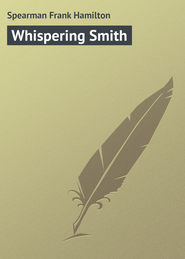По всем вопросам обращайтесь на: info@litportal.ru
(©) 2003-2024.
✖
Held for Orders: Being Stories of Railroad Life
Настройки чтения
Размер шрифта
Высота строк
Поля
Yet three days the Spider raged, and knew then its master, while he, three whole days sat at the bottom of the Peace clutching the engine levers in the ruins of Agnew's mistake.
And when the divers got them up, Callahan and Bucks tore big Peeto's arms from his master's body and shut his staring eye and laid him at his master's side. And only the Spider ravening at Hailey's caissons raged. But Hailey slept.
The Striker's Story
McTERZA
I would not call her common. Not that I would be afraid to, though most of the boys were more or less afraid of Mrs. Mullenix, but simply that it wouldn't be right – not in my opinion.
She kept a short order house, let that be admitted at once, but her husband was long a West End engineer. Denis Mullenix went into the Peace with Hailey and Ed Peeto and Durden the night of the big June water on the West End. The company didn't treat her just right. I was a strong company man, although I went out with the boys. But I say, and I've always said, the company did not treat Mrs. Mullenix just right.
A widow, and penniless, she bought the eating-house at McCloud with the few hundreds they gave her.
There were five young Mullenixes, and they were, every one, star children, from Sinkers, who was foxy, to Kate, who was not merely fine, she was royal. Twenty, and straight, and true, with a complexion like sunrise and hair like a sunset. Kate kept the cottage going, and Mrs. Mullenix ruled personally in the eating-house and in the short order annex. Any one that has tasted a steak grilled swell in Chicago or in Denver, and tasted one broiled plain by Mrs. Mullenix in McCloud, half a block from the depot, can easily understand why the boys behaved well. As for her coffee, believe it or not, we owe most of our world-famous West End runs, not so much to the Baldwin Locomotive Works, renowned as they are, nor to Mr. George Westinghouse, prince of inventors though we rank him – but to the coffee drawn by Mrs. Mary Mullenix; honor where honor is due.
Mrs. Mullenix's coffee for many years made the boys hot: what now makes them hot is that she can't be persuaded to draw it for anybody except McTerza, and they claim that's the way he holds the Yellow Mail with the 808; but all the same McTerza is fast stuff, coffee or no coffee.
They were none of them boisterous men, those Reading engineers who took our jobs after the strike; but McTerza was an oyster, except that he couldn't be swallowed.
McTerza didn't give up very much to anybody; not even to his own chums, Foley and Sinclair. The fact is he was diffident, owing, maybe, to a hesitation in his speech. It was funny, the bit of a halt, but not so odd as his disposition, which approached that of a grizzly. He had impudence and indifference and quiet – plenty of each.
There was one place up street that was, in special and particular, headquarters for the bad men in our crowd – for we had some – Gatling's billiard hall. Foley himself never had the nerve to tackle Gatling's. But one night, all alone and come from nobody knew where, the hall stuffed with striking men who had tasted blood that very day – McTerza walked into Gatling's.
It was like a yearling strolling into a cañon full of wolves. They were so surprised at first they couldn't bite, but pretty soon they got McTerza up against a mirror and began pasting pool balls at him.
When Ed Banks arrived it was as bad as a rapid-fire gun, and he carried McTerza out the side door like a warm tapioca pudding. When the fellow got round again, though, he was just as careless as ever.
It was pretty generally understood that in the strike the short order house was with us. Mrs. Mullenix had reason to feel bitter toward the company, and it became speedily known that Mrs. Mullenix's was not a healthy place for the men who took our engines; their money was not wanted. In fact, none of the new men ever tried to get service there except McTerza. McTerza one morning dropped into the short order house.
"Coffee," said he; he always cut things short because he was afraid he would get hung up between stations in remarks. Mrs. Mullenix, sick, had to manage as she could. Kate was looking after things that day at the restaurant, and she was alone. She looked at McTerza chillingly. Kate had more than enough instinct to tell a Reading man from the Brotherhood type. She turned in silence, and she poured a cup of coffee, but from the night tank: it was the grossest indignity that could be perpetrated on a man in the short order management. She set it with little of civility and less of sugar before McTerza, and pushing her girdle down, coldly walked front, half perched on a stool, and looked listlessly out the window.
"Cool," ventured McTerza as he stirred a lump of sugar hopefully into his purchase. Kate made no comment on the observation; the thing appeared self-evident.
"Could I have a little c-c-condensed milk?" inquired McTerza presently. "This sc-sc-scream looks pretty rich," he added, stirring thoughtfully as he spoke at the pot of mustard, which was the only liquid in sight.
Kate Mullenix glared contemptuously at him, but she passed out a jug of cream – and it was cream. From the defiance on her face as she resumed her attitude she appeared to expect a protest about the cold coffee. None came. McTerza drank the stuff very slowly, blowing it carefully the while as if it was burning him up. It vexed Kate.
"How much?" asked McTerza humbly, as he swallowed the last drop before it froze to the spoon, and fished for a dime to square his account.
"Twenty-five cents." He started slightly but reached again into his pocket and without a word produced a quarter. Kate swept it into the drawer with the royal indifference of a circus faker and resumed her stool.
"C-c-could I get another c-c-cup?" asked McTerza patiently. It looked like a defiance; however she boldly poured a second cup of the cold coffee, and McTerza tackled it.
After an interval of silence he spoke again. "Do you sell tickets on c-coffee here?" She looked at him with a questioning insolence. "I mean, c-could a fellow buy a chance – or get into a raffle – on the h-h-h-hot tank?" asked McTerza, throwing a sad glance on the live coffee urn, which steamed cozily beside its silent companion.
"That tank is empty," snapped Kate Mullenix recklessly, for in spite of herself she was getting confused.
"If it is," suggested McTerza, peering gravely underneath at the jet of gas that blazed merrily, "you ought to draw your fire: you're liable to b-b-burn your c-c-crown-sheet."
"What's the matter?" demanded Kate angrily; "is your coffee cold?"
"Oh, no," he responded, shaking his head and waiting for the surprising disclaimer to sink in. "Not exactly cold. It's just dead."
"We don't serve Reading men here," retorted Kate defiantly.
"Oh, yes, you do," responded McTerza, brightening at once. "You serve them like t-t-tramps." Then after a pause: "Could I get a cigar?"
"Yes."
"How much is that kind?"
"Fifty cents," snapped Kate, glancing into the street for some friendly striker to appear.
"I want a good one."
"That's a good one."
"Fifty cents a b-b-box?"
"Fifty cents apiece."
"Give me a small one, please."
He put down a dollar bill as he took the cigar. She threw a half back on the case. At that moment in walked two of our boys, Curtis Rucker and Ben Nicholson. McTerza had a great chance to walk out, but he didn't improve it. Rucker and Ben were Reds, both of them. Ben, in fact, was an old terror at best. Curtis Rucker was a blackish, quick young fellow, fine as silk in a cab, but a devil in a strike, and what was more, a great admirer of Kate Mullenix, and the minx knew it. As McTerza bit off the end of his cigar and reached for the gas-lighter he noticed that her face lighted wonderfully.
With a smile the newcomers called for coffee, and with a smile they got it. McTerza, smoking quietly at the cigar-case, watched the steaming liquid pour from the empty tank. It was a dispiriting revelation, but he only puffed leisurely on. When Kate glanced his way, as she presently did, disdainfully, McTerza raised his finger, and pointed to the change she had thrown at him.
"What is it, sir?"
"Mistake."
The strikers pricked up their ears.
"There isn't any mistake, sir. I told you the cigars were fifty cents each," replied Kate Mullenix. Rucker pushed back his coffee, and sliding off his stool walked forward.
"Change isn't right," persisted McTerza, looking at Kate Mullenix.
"Why not?"
"You forgot to take out twenty-five cents more for that last cup of c-c-coffee," stammered the Reading man. Kate took up the coin and handed a quarter back from the register.
"That's right," put in Rucker promptly, "make the scabs p-p-pay for what they g-g-get. They're sp-p-p-pending our money." The hesitating Reading man appeared for the first time aware of an enemy; interested for the first time in the abuse that had been continually heaped on him since he came to town: it appeared at last to reach him. He returned Rucker's glare.
"You call me a scab, do you?" he said at last and with the stutter all out. "I belong to a labor order that counts thousands to your hundreds. Your scabs came in and took our throttles on the Reading – why shouldn't we pull your latches out here? Your strike is beat, my buck, and Reading men beat it. You had better look for a job on a threshing machine."
Rucker jumped for McTerza, and they mixed like clouds in a cyclone. For a minute it was a whirlwind, and nothing could be made of it; but when they could be seen McTerza had the best man in our camp pinned under a table with his throat in one hand like the latch of a throttle. Nicholson at the same moment raising an oak stool smashed it over McTerza's head. The fellow went flat as a dead man, but he must have pulled up quick, for when Neighbor, rushing in, whirled Nicholson into the street, the Reading man already had his feet, and a corner to work from. Reed, the trainmaster, was right behind the big master mechanic. Rucker was up, but saw he was outnumbered.
"Hurt, Mac?" asked Reed, running toward the Reading man. The blow had certainly dazed him; his eyes rolled seasick for a minute, then he stared straight ahead.










